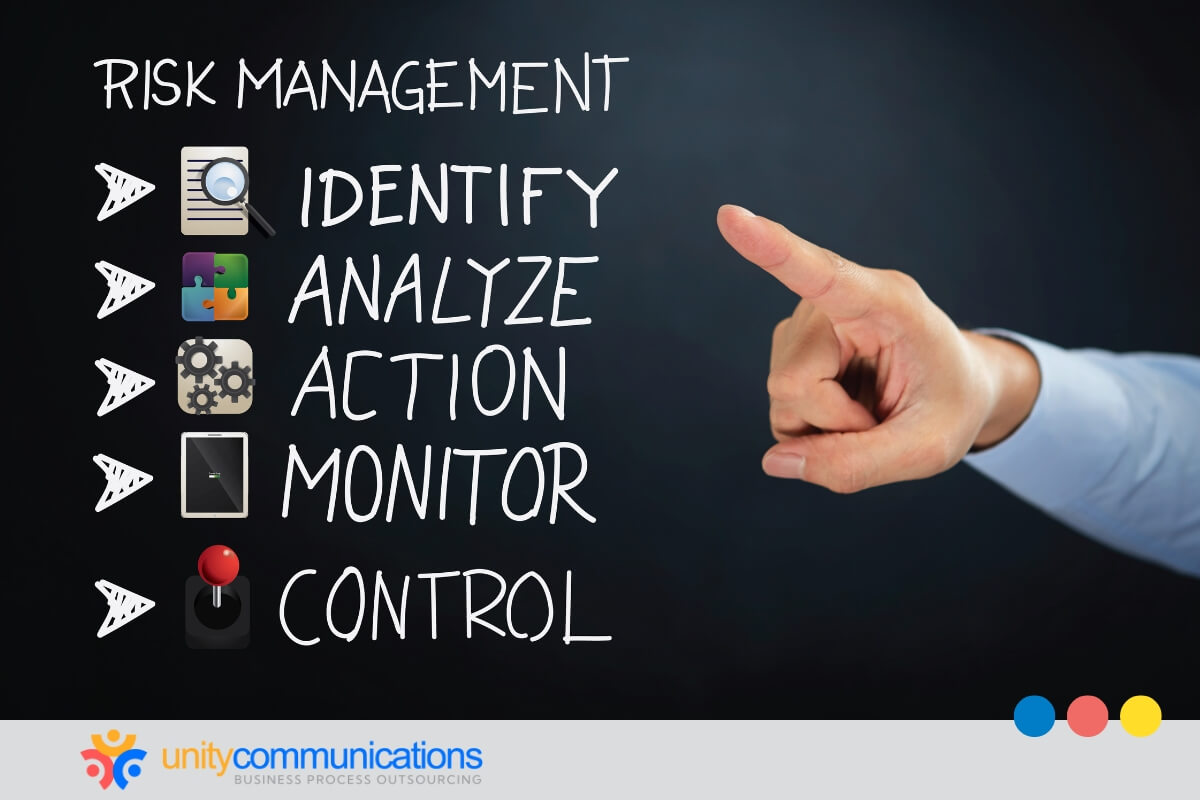IN THIS ARTICLE
Table of Contents
Cybercrime is a significant concern that can jeopardize your company’s data and operations without appropriate safeguards. Cybersecurity plays a vital role in every business, safeguarding sensitive business and customer information.
Business process outsourcing (BPO) providers can help detect and mitigate cybersecurity threats. They assist clients in identifying a breach, containing damage, and minimizing the risk of future incidents.
This article discusses the role of BPO in cybersecurity incident response, how providers detect and mitigate threats, and why client companies outsource this critical function.
Role of BPO in cybersecurity incident response

Incident response refers to the systematic approach organizations use when managing a data breach or cyberattack. It involves promptly recognizing an attack, mitigating its impact, limiting harm, and addressing its root cause to diminish the likelihood of similar incidents in the future.
Incident response is an integral component of any corporate cybersecurity measure. Swift and effective responses to security incidents are crucial, as they aid in expediting recovery, restoring business operations, and mitigating potential high costs.
Reports show that 46% of cyber breaches affect companies with fewer than 1,000 employees. However, companies, especially small businesses, cannot keep pace with advanced cyberattacks. Their IT departments lack the skills to handle them independently.
So, what is BPO’s role in ensuring effective cybersecurity incident response? BPO providers offer specialized services and support to organizations. Here are several ways in which BPO can contribute to this strategy:
- 24/7 monitoring and detection. BPO providers can monitor security events and incidents around the clock, leveraging advanced technologies such as security information and event management (SIEM) systems. Continuous tracking allows for the early detection of potential security threats, enabling a faster response.
- Incident triage and analysis. BPO teams can assist in triaging and analyzing security incidents, categorizing them based on severity and impact. Initial analysis by BPO experts can help determine the nature of the incident, allowing in-house cybersecurity teams to prioritize and respond effectively.
- Forensic investigation. BPO experts with forensic analysis skills can conduct detailed investigations into the root cause of security incidents. This expertise is crucial in understanding threat actors’ tactics, techniques, and procedures (TTPs), aiding in developing effective countermeasures.
- Incident documentation and reporting. BPO services can assist in documenting incident details and maintaining comprehensive records for regulatory compliance and internal analysis. They can generate incident reports summarizing the attack, its impact, and the steps taken for resolution.
- Incident containment and eradication. BPO providers can assist in implementing containment measures to prevent the incident from spreading further. They can also support eradicating the incident’s root cause by working with internal teams to eliminate vulnerabilities and weaknesses.
- Post-incident analysis and recommendations. BPO vendors can contribute to post-incident analysis by providing insights and suggestions for improving incident response capabilities. Continuous improvement is essential, and BPO providers can help refine these processes.
- Training and awareness. BPO teams can offer training programs to educate workers on cybersecurity best practices and awareness. Enhanced awareness can contribute to a proactive approach to identifying and reporting potential security incidents.
- Security operations center (SOC). Organizations can outsource their SOC operations to a BPO provider, allowing them to benefit from a dedicated team of cybersecurity experts without significant in-house resources.
How BPO teams detect and mitigate cybersecurity incidents
BPO providers employ advanced technologies, skilled personnel, and well-defined processes to detect and mitigate cybersecurity incidents. Here’s an overview of how vendors typically handle cybersecurity incidents:
- Anomaly detection. BPO companies use behavioral analysis and anomaly detection techniques to identify deviations from standard systems and user behavior patterns. Unusual spikes in network traffic, unexpected access patterns, or irregular login activities are anomalies that can trigger alerts.
- Intrusion detection and intrusion prevention systems (IDS/IPS). BPO firms deploy IDS and IPS solutions to detect and prevent unauthorized access and malicious activities. These systems analyze network traffic, look for known attack signatures or suspicious behavior, and take action to block or mitigate potential threats.
- Endpoint security. BPO teams secure endpoints (such as desktops, laptops, and mobile devices) by deploying endpoint security solutions. These solutions include antivirus software, endpoint detection and response (EDR) tools, and advanced threat protection mechanisms to detect and mitigate threats at the device level.
- Threat intelligence. BPO leverages threat intelligence feeds to stay informed about the latest cyber threats and attack vectors. This information helps them proactively update security measures and identify potential indicators of compromise.
Reasons businesses leverage BPO for cybersecurity incident response

BPO can be a strategic decision for organizations facing various challenges in cybersecurity incident response or seeking specific benefits. Here are some reasons why organizations might choose to outsource this function:
- Global threat intelligence. Cybersecurity service providers often have access to global threat intelligence networks. These allow them to stay informed about emerging threats and trends, providing a more comprehensive and up-to-date understanding of the threat landscape.
- Improved compliance and risk management. Outsourcing incident response to a provider with expertise in regulatory compliance ensures that organizations meet industry-specific requirements. Adherence is particularly important for sectors with strict data protection and privacy regulations.
- Continuous improvement. Outsourcing partners are incentivized to stay at the forefront of cybersecurity. Organizations benefit from the partner’s commitment to constant improvement, including adopting new methodologies and best practices.
- Reduced time to remediation. A specialized incident response team will likely have experience dealing with various security incidents. Compared to an in-house team that might be less experienced, expert third-party teams can lead to faster detection, analysis, and remediation of incidents.
- Mitigated staff shortages. The difference between the global need for cyber talent and actual capacity was approximately 3.4 million individuals in 2022. The worldwide shortage of cybersecurity professionals makes building and maintaining a skilled in-house team challenging. Outsourcing helps ensure a consistent level of expertise.
How to select a BPO partner for cybersecurity incident response
Selecting the right BPO organization for cybersecurity incident response is crucial to ensure effective and secure handling of potential security threats. Here are some key considerations when choosing a suitable BPO partner:
- Security expertise and experience. Assess the BPO provider’s expertise in cybersecurity, incident response, and relevant technologies. Look for a partner with a proven track record in handling incidents, preferably in your industry, and inquire about their experience with similar organizations.
- Certifications and compliance. Verify that the BPO partner holds relevant certifications and complies with industry standards. Examples include ISO 27001 for information security management and CREST or GIAC certifications. Ensure the provider complies with industry- and location-specific data protection regulations.
- Monitoring and response capability. Confirm that the BPO partner provides 24/7 monitoring and incident response. Cyber threats can occur anytime, and timely response is critical. Evaluate their monitoring infrastructure, including SIEM systems and other detection tools.
- Incident response process and procedures. Review the BPO partner’s incident response processes and procedures. Ensure they have a well-defined incident response plan that aligns with best practices. Inquire about their methodologies for incident triage, analysis, containment, eradication, and post-incident reporting.
- Forensic capabilities. A solid understanding of forensic techniques is essential for thorough investigations into the root cause of incidents. Check if providers have experience in preserving and analyzing digital evidence in a legally sound manner.
- Collaboration and communication. BPO teams should be able to collaborate seamlessly with internal teams. Communication is crucial during incident response, and seamless cooperation enhances the overall effectiveness of the response efforts. This approach allows for a more coordinated and efficient incident resolution process.
The bottom line

If cybersecurity incident response sounds too technical, that’s because it is. Thus, many businesses seek the help of BPO firms specialized in cybersecurity incident response to get it right.
When the consequences of failure are increasingly significant, relying on a third party for cybersecurity incident response is a way to guarantee the fulfillment of crucial elements in effective risk mitigation. Moreover, opting for a single on-demand partner allows seamless integration of all aspects into a tailored package.
Let’s connect if you want to learn more about Unity Communication’s incident response process!





